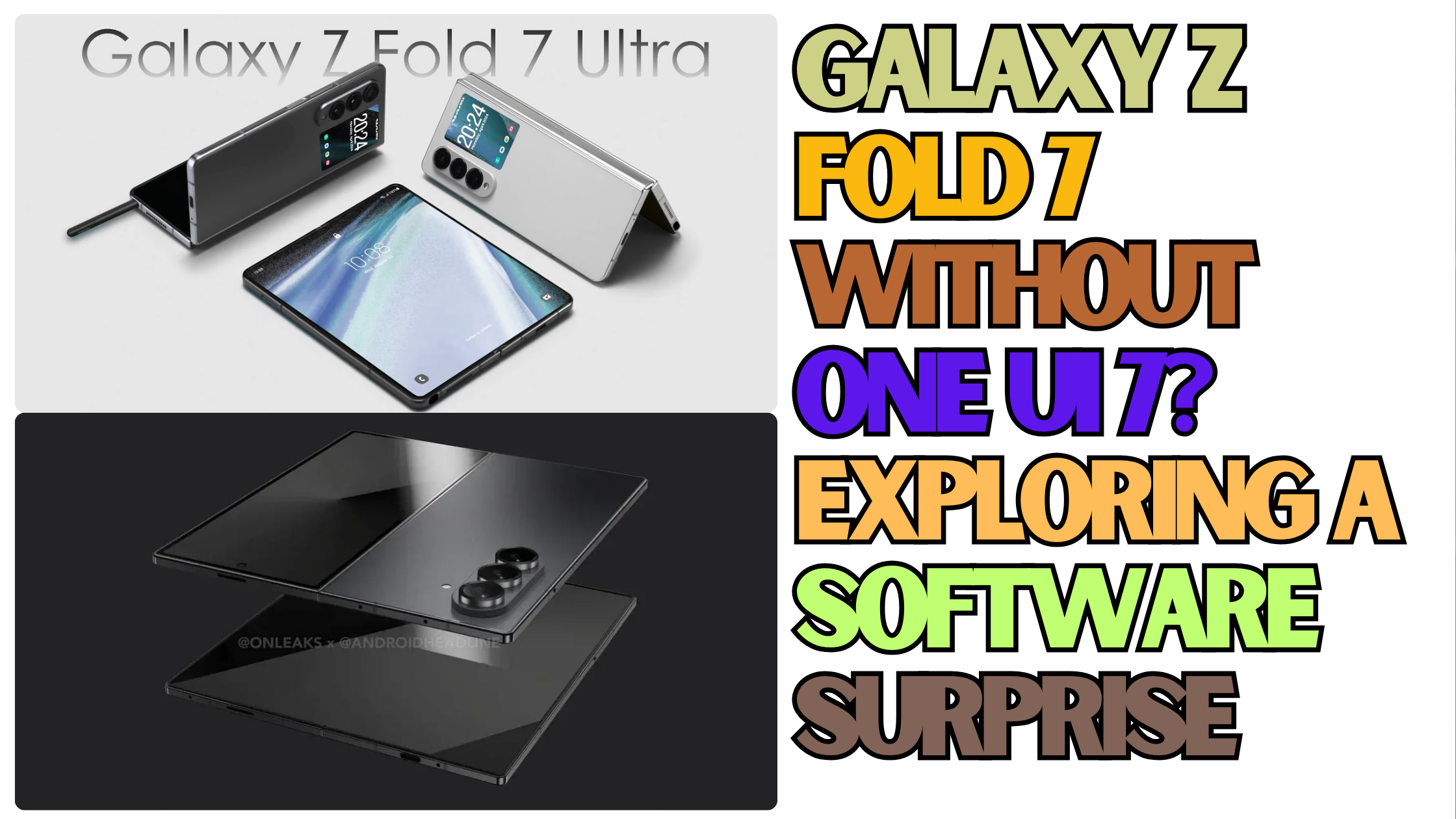Imagine the next generation of Samsung’s groundbreaking foldable phone, the Galaxy Z Fold 7. You’re picturing the sleek design, the innovative hinge, and the expansive inner screen. But what if the software that powers it all was completely different from what you expect? What if the Galaxy Z Fold 7 launched without Samsung’s familiar One UI 7? It sounds surprising, right? For years, Samsung has layered its custom One UI on top of Android, giving its devices a distinct look and feel. So, let’s dive into this intriguing possibility and explore what it might mean for the future of foldable technology.
Understanding Samsung’s Software: The Importance of One UI
Before we get too far, let’s talk about what One UI actually is. Think of it as Samsung’s special recipe for Android. While all Android phones share a common base operating system developed by Google, each manufacturer can add its own unique layer of software to customize the experience. This is where One UI comes in. It’s the interface you interact with on Samsung phones – the way the menus look, the special features you get, and how everything works together.
One UI is known for its clean design, user-friendly features, and tight integration with Samsung’s ecosystem of devices. It offers a lot of customization options, allowing users to personalize their phone to their liking. Features like Multi Window (for running multiple apps side-by-side), advanced camera controls, and seamless connectivity with Samsung tablets and wearables are all part of the One UI experience. For many Samsung users, One UI is a key reason why they choose Samsung devices over others. It’s familiar, it’s feature-rich, and it’s designed to work well with Samsung’s hardware.
Why the Question? Exploring the Possibility of a Software Shift
So, why even consider the possibility of the Galaxy Z Fold 7 not having One UI 7? While it might seem unlikely given Samsung’s history, the tech world is full of surprises. There could be several reasons why this scenario might be a topic of discussion, even if it’s just speculation at this point.
Perhaps Samsung is considering a new software approach specifically tailored for the unique form factor of foldable phones. The way we use a device that can transform from a regular smartphone to a small tablet is different, and maybe Samsung believes a completely fresh software experience is needed to truly unlock the potential of this technology. It’s also possible that Samsung might be experimenting with different software strategies internally, and the idea of a flagship device launching with a different interface could be part of that exploration. While there haven’t been any concrete rumors pointing to this, it’s always interesting to consider the “what ifs” in the ever-evolving world of mobile technology.
Brand New User Interface Designed for Foldables
One possibility is that Samsung might be developing an entirely new user interface specifically for its foldable devices, potentially debuting it with the Galaxy Z Fold 7. This new UI could be designed from the ground up to take full advantage of the larger inner screen and the unique ways users interact with a foldable phone.
Imagine a software experience that seamlessly transitions between the cover screen and the main display, offering innovative ways to multitask, view content, and interact with apps. This new interface could introduce unique features and layouts that are simply not possible on traditional smartphones. For instance, it might offer more advanced multi-window capabilities, allowing users to run more apps simultaneously and interact with them in more intuitive ways. It could also have specialized modes for different folding angles, making the device even more versatile. While this would be a significant undertaking for Samsung, it could also be a way to further differentiate their foldable phones and push the boundaries of what’s possible.
Embracing a Pure Android Experience on the Fold 7
Another intriguing possibility is that Samsung might opt for a more “pure” or stock version of Android on the Galaxy Z Fold 7. This is the kind of software experience you typically find on Google’s Pixel phones. It’s characterized by a cleaner interface, fewer pre-installed apps, and often faster software updates directly from Google.
There could be several reasons why Samsung might consider this. A pure Android experience could be perceived as less cluttered and potentially faster by some users. It could also streamline the software development process for Samsung, allowing them to focus more on the core functionalities and hardware of the device. For users who prefer a simpler, less customized software experience, this could be a welcome change. However, it would also mean losing some of the unique features and customizations that Samsung has built into One UI over the years, which are beloved by many loyal Samsung fans.
Implications for Users: What Would Change Without One UI 7?
The absence of One UI 7 on the Galaxy Z Fold 7 would have a significant impact on the user experience. The most immediate change would be the visual appearance of the phone. The icons, menus, and overall design language would likely be different, depending on whether Samsung opts for a new custom UI or a pure Android approach.
Beyond the looks, the functionality could also change considerably. Users might find different pre-installed apps, different ways to navigate the system, and potentially a different set of unique features. For example, if the phone ran on pure Android, users might miss Samsung’s advanced multi-window features or their integration with the S Pen (if the Z Fold 7 continues to support it). On the other hand, a new, foldable-specific UI could introduce entirely new ways of interacting with the device that users haven’t experienced before. Ultimately, the software is a crucial part of the overall smartphone experience, and a change as significant as not having One UI 7 would definitely be noticeable for anyone using the Galaxy Z Fold 7.
Impact on Samsung’s Brand and Strategy in the Foldable Market
Samsung has positioned itself as a leader in the foldable phone market, and One UI has played a role in that by offering a software experience that is tailored (to some extent) for the unique foldable form factor. A decision to move away from One UI for their flagship foldable device could signal a shift in their overall strategy.
If Samsung were to adopt a pure Android approach, it might appeal to a broader audience who prefer a simpler software experience. However, it could also alienate loyal Samsung users who have come to appreciate the features and design of One UI. On the other hand, introducing a completely new, innovative UI specifically for foldables could further solidify Samsung’s position as a pioneer in this category, showcasing their commitment to creating the best possible software experience for these unique devices. It would be a bold move that could either be a huge success or a significant gamble.
The Likelihood: What Does Samsung’s History Tell Us?
Considering Samsung’s long history of developing and refining its own custom software, the possibility of the Galaxy Z Fold 7 launching without One UI 7 seems relatively low at this point. Samsung has invested heavily in the One UI ecosystem and consistently releases new versions with their flagship devices. It has become a core part of their brand identity.
However, the foldable market is still relatively new, and companies are constantly experimenting with different approaches. It’s not entirely impossible that Samsung might see a strategic advantage in trying a different software path for their foldable line, especially if they believe it could lead to a superior user experience for this unique category of devices. Only time will tell what Samsung ultimately decides to do.
Conclusion: An Unexpected Software Twist for the Future of Foldables?
The idea of the Samsung Galaxy Z Fold 7 launching without One UI 7 is certainly a thought-provoking one. Whether Samsung decides to stick with their familiar software, develop a brand-new interface specifically for foldables, or even embrace a pure Android experience, the software will undoubtedly play a crucial role in shaping the user experience of this innovative device. While it seems unlikely based on their history, the possibility highlights the dynamic nature of the tech industry and the potential for unexpected changes as companies continue to push the boundaries of mobile technology, especially in the exciting realm of foldable phones.

